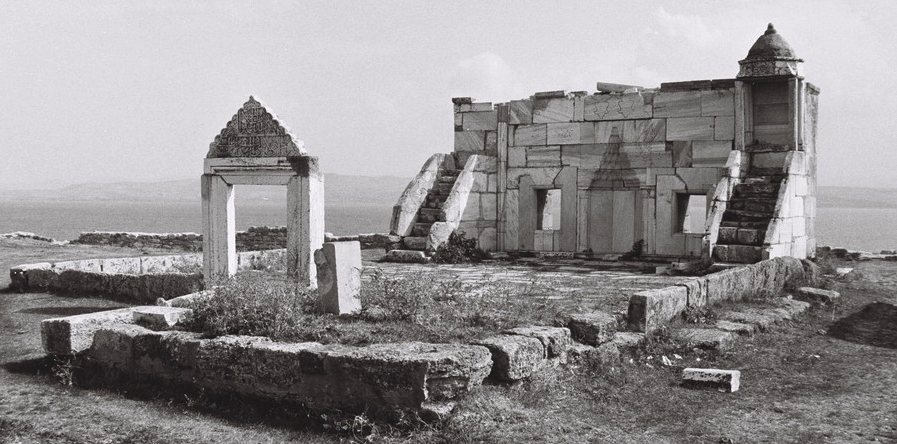The Spiritual Vernacular of the Early Ottoman Frontier
with Carlos Grenier
| How did one learn to be a good Muslim in the early 15th century? In newly conquered Ottoman lands where Christians and converts lived side by side, how would one go about learning the proper rites and beliefs to hold? This conversation with Carlos Grenier explores the lives and ideas of two brothers, Mehmed Yazıcıoğlu and Ahmed Bican, Sufis of the frontier city of Gelibolu who grappled with this very question. Their response was to craft a synthesis, an Ottoman Islam so to speak, in the form of Turkish texts that guided their communities on the proper way to be a Muslim. They reached an enormous readership and rank as some of the most popular books to ever be produced in Ottoman Turkish. And as Grenier explains, the Yazıcıoğlus articulated a new Ottoman spiritual vernacular forged in the balance between two worlds of the Balkan and Mediterranean frontiers and the Islamic intellectual sphere.

 | Click for RSS Feed | 
|

|
How did one learn to be a good Muslim in the early 15th century? In newly conquered Ottoman lands where Christians and converts lived side by side, how would one go about learning the proper rites and beliefs to hold? This conversation with Carlos Grenier explores the lives and ideas of two brothers, Mehmed Yazıcıoğlu and Ahmed Bican, Sufis of the frontier city of Gelibolu who grappled with this very question. Their response was to craft a synthesis, an Ottoman Islam so to speak, in the form of Turkish texts that guided their communities on the proper way to be a Muslim. They reached an enormous readership and rank as some of the most popular books to ever be produced in Ottoman Turkish. And as Grenier explains, the Yazıcıoğlus articulated a new Ottoman spiritual vernacular forged in the balance between two worlds of the Balkan and Mediterranean frontiers and the Islamic intellectual sphere.
Contributor Bios
 |
Carlos Grenier is an Assistant Professor in the Department of Religious Studies at Florida International University. His recent book, The Spiritual Vernacular of the Early Ottoman Frontier, and published by Edinburgh University Press, analyzes the life and works of the Yazıcıoğlu brothers of fifteenth-century Gelibolu, authors of important works of popular Ottoman Islam. Dr. Grenier is interested in religion in the early Ottoman Empire and pre-Ottoman Anatolia, in Sufis within their political contexts, in vernacular Islamic literature within global Islam, and in late medieval and early modern philosophy of nature and of language. |
 |
Maryam Patton is a PhD candidate at Harvard University in the joint History and Middle Eastern Studies program. Her research explores cultural, intellectual, and scientific exchanges across the early modern Mediterranean. Her dissertation studies the cultural history of time and temporal consciousness in 16th century Istanbul and Venice. She is also the host of "Desert Cruising with Captain Ahab," a weekly rock and metal show at WPRB Princeton. |
Further Listening
 |
Rudi Paul Lindner | 511
8/20/21
|
The Origins of Ottoman History |
 |
Hüseyin Yılmaz | 444
1/11/20
|
The Mystical Turn in Ottoman Political Thought |
 |
Zeynep Oktay Uslu | 359
4/20/18
|
Dervish Piety and Alevism in Late Medieval Anatolia |
 |
Nicolas Trépanier | 233
3/22/16
|
Foodways in Medieval Anatolia |
 |
Sara Nur Yıldız | 186
3/13/15
|
New Perspectives on Medieval Anatolia |
 |
Buket Kitapçı Bayrı | 492
2/3/21
|
Diyar-ı Rum’dan Hikayeler |
Credits
Episode No. 520
Release Date: 4 February 2022
Recording Location: Miami, FL / Oxford, UK
Sound production by Maryam Patton
Release Date: 4 February 2022
Recording Location: Miami, FL / Oxford, UK
Sound production by Maryam Patton
Bibliography courtesy of Carlos Grenier
The Yazıcıoğlus’ own writings in recent critical editions
Çelebioğlu, Âmil, ed., Muhammediye. İstanbul: Milli Eğitim Bakanlığı, 1996.
Abdullah Uğur, Yazıcıoğlu Aḥmed Bīcān and his Envārü'l-ʻāşıḳīn (introduction and critical edition): Envâruʼl âşıkı̂n (Volumes 140-142 of Sources of Oriental Languages and Literatures: Turkic Sources), eds. Cemal Kafadar and Gönül Alpay-Tekin. Cambridge, Mass: Department of Near Eastern Languages and Civilizations, Harvard University, 2019.
Secondary Sources
Atçıl, Abdurrahman, Scholars and Sultans in the Early Modern Ottoman Empire.Cambridge: Cambridge University Press, 2018.
Nikolay Antov, The Ottoman ‘Wild West’: The Balkan Frontier in the Fifteenth and Sixteen Centuries. Cambridge: Cambridge University Press, 2017.
Grenier, Carlos, “Reassessing the Authorship of the Dürr-i Meknun,” Archivum Ottomanicum 193–212, no. 35 (2018).
Kafadar, Cemal, Between Two Worlds: The Construction of the Ottoman State. Berkeley: University of California Press, 1996.
Kaptein, Laban, Apocalypse and the Antichrist Dajjal in Islam: Ahmed Bijan’s Eschatology Revisted. Asch: privately published, 2011.
Kastritsis, Dimitris J., The Sons of Bāyezīd Empire Building and Representation in the Ottoman Civil War of 1402-1413. Leiden, Boston: Brill, 2007.
Krstić, Tijana, Contested Conversions to Islam: Narratives of Religious Change in the Early Modern Ottoman Empire. Stanford, California: Stanford University Press, 2011.
Terzioğlu, Derin, “Sufis in the Age of State-Building and Confessionalization”, in Christine Woodhead (ed.), The Ottoman World. Milton Park: Abingdon 2012.
_____, “Where ʻİlmihal Meets Catechism: Islamic Manuals of Religious Instruction in the Ottoman Empire in the Age of Confessionalization,” Past & Present 220, no. 1 (August 1, 2013): 79–114.
Yerasimos, Stéphane, La Fondation de Constantinople et de Sainte-Sophie dans les traditions turques: légendes d’empire. Istanbul; Paris: Institut français d’études anatoliennes; Librairie d’Amérique et d’Orient, J. Maisonneuve, 1990.
Yılmaz, Hüseyin, Caliphate Redefined: The Mystical Turn in Ottoman Political Thought (Princeton: Princeton University Press, 2019).












Comments
Post a Comment
Due to an overwhelming amount of spam, we no longer read comments submitted to the blog.